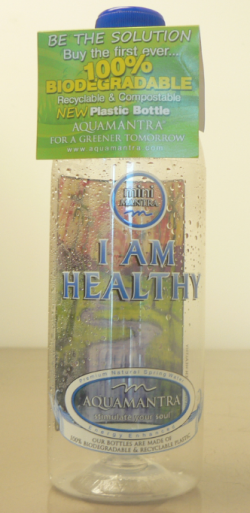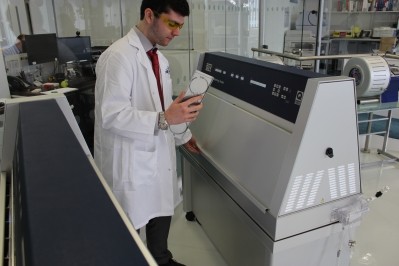Symphony attacks ‘absurd’ Californian marketing ban on oxo-bio plastics

The firm’s comments followed an October 26 announcement by the State of California Justice Office, which said that attorney general Kamala D. Harris had filed a lawsuit against 3 companies: ENSO Plastics, Balance and Aquamantra.
Announcing the first such suit under the state’s 2008 environmental marketing law, Harris alleged that the firms had made “false and misleading claims” by marketing their plastic water bottles as 100 per cent ‘biodegradable’ and ‘recyclable’.
Both Balance and Aquamantra sell products in plastic water bottles (one is pictured) marketed by ENSO Plastics, which adds a microbial additive to polyethylene terephthalate (PET) bottles.
Although it is not subject to the suit, Symphony Environmental has developed its oxo-biodegradable brand d2w, a plastics additive designed to control and shorten the shelf life of plastic packaging such as bottles and plastic bags.
‘Absurd’ legal situation
After the filing, Symphony said it would “welcome a dialogue” with Californian authorities to discuss what it claimed was extensive published science supporting the efficacy of oxo-biodegradable technology, and “awaited an invitation” accordingly.
But deputy chairman Michael Stephen told FoodProductionDaily.com yesterday that – despite having a US distributor and many customers in the country – the firm had not been contacted by the state.
Stephen said: “No we haven’t [received an invitation]. And you would expect them to issue one, working in good faith, wouldn’t you? But they haven’t.”
He added: “What the California attorney general is doing is attacking a company in a competitive industry, which produces bottles said to be biodegradable but operate via a completely process to oxo-biodegradability, which is what we are.”
Nonetheless, Stephen said that Symphony thought the law in California was “absurd, even though we’re not being prosecuted ourselves. Essentially, they haven’t banned the sale of biodegradable plastics in California, they’ve just said that you can’t describe them as such”.
“This conflicts with what the Federal Trade Commission (FTC) in the US expects, that you inform customers what they’re buying. But all the biodegradable plastics people (oxo, hydro- or ENSO) are prevented from telling the public that the product is biodegradable.”
Competitive disadvantage
Attacking the state ban on such marketing claims, Stephen added: “It puts us at a disadvantage to the compostable plastics industry, which is the people who make plastics out of vegetable-based materials. They can describe products as compostable, we can’t describe ours as biodegradable.”
Andy Sweetman, chairman of trade body European Bioplastics – which does not believe oxo-biodegradable plastic products are truly biodegradable – told FoodProductionDaily.com that he wasn’t surprised by the US legal action.
He added: “Italy, for example, has had similar ruling on certain materials, and there is also an example in Australia of a prosecution based on a misleading claim over the biodegradability for such technologies.”
Asked why European Bioplastics didn’t support oxo-biodegradable plastics, Sweetman said: “If you’re talking about materials that are biodegradable and compostable, then you are talking about materials designed to be useful in a managed waste management system."
He added: “If you say a material is simply biodegradable, but it doesn’t actually work in a composting or anaerobic digestion type environment, then you start to ask, ‘what is the point of that technology?'"
"We’re talking about classic plastics, which effectively fragment. What’s the value of that? Why are you doing it and what’s the point of it? And that’s an extremely difficult question to answer.
"What is the value of an oxo-biodegradable material, if it doesn’t actually aid waste management technologies at all?”
ENSO questions Californian motives
Launching the suit, the Californian attorney general’s office cited one ENSO label claiming that its additive allowed the creation of the “first truly biodegradable and recyclable” plastic bottle, which would break down in less than 5 years in a landfill or compost environment.
But Harris’s office said: “The claim is false because the additive does not speed up the centuries long process required to break-down plastic.”
The attorney general also took aim at ENSO’s recycling claim, citing the US Association of Post-Consumer Plastic Recyclers standpoint that the firm’s microbial additive was a “destructive contaminant” that could compromise product strength.
Consumers might either dispose of bottles incorrectly (assuming wrongly that they would biodegrade quickly), leading to pressure on landfill space, Harris's office said, or try to recycle them, creating costs and problems for recyclers.
In a statement, ENSO Plastics said it would comply with the California attorney general regarding the labeling law, but said it was “unfortunate” that this made it illegal for companies to label such products as ‘biodegradable’.
“It leads one to question the true intent behind the law, especially when that law was supported and sponsored by the compostable plastics industry organisation,” ENSO added.
You can access a copy of the filing in Orange County Superior Court, California, here.




